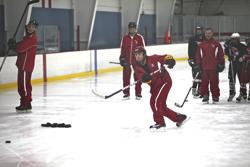08
April
The Season of Champions
Posted by Greg Carter

April is one of the great hockey months. In the NHL we have the push to the playoffs, which means a few things: the intensity ratchets up several notches, the speed of the game shifts up a gear or two and of course the facial hair is grown out. During April we also have college hockey’s Frozen Four. This is another great tournament as unpaid players are putting it all on the line not for a huge paycheck, but rather for the simple right to win a championship.
You can’t help but watch the incredible hockey this time of year and wonder, ‘what does it really take to get to that level of play’ . . . not just playing at the highest level, but to advance through the regular season and the playoffs and ultimately hit the ice and play on the biggest stage, under the brightest lights for the right to hoist the biggest trophy.
For most of players, and you’ll hear this in post-game interviews, the ‘what it really takes’ is determination. Not just team determination, but individual determination. And that determination didn’t just start at the end of the regular season or the weeks leading into the playoffs as the team fought to make the post season. For the most successful players, that determination started a long time ago in a basement, garage, backyard rink or local park.
Determination goes hand and hand with hard work. The great Vince Lombardi once said “The price of success is hard work, dedication to the job at hand, and the determination that whether we win or lose, we have applied the best of ourselves to the task at hand.”
Every hockey player wants to win, wants to make the playoffs, wants to play for the championship and wants to hoist the trophy. The reality is that the players who do end up in these games are the ones who have realized at a young age what it really takes to get there. First and foremost it requires a love of the game. After that, it takes commitment, determination and hard work.
The best players that I’ve played with have all possessed these traits. They were the guys at the rink first and off the ice last. They loved shooting pucks. They loved practicing and trying to get better every day. And I mean every day. They loved being at the rink, and when they weren’t they were making mom and dad upset by staying at the local rink two hours too long. They were quintessential rink rats, who also had skill, determination and weren’t afraid of hard work.
So when you see players on TV hoisting a trophy, some doing so in tears, it’s important to understand that the journey for these players didn’t start at the beginning of the season. It started at the beginning of their recognition that with determination and hard work, there can be no limits to your success.
When does your journey begin?




 Subscribe
Subscribe Subscribe
Subscribe




